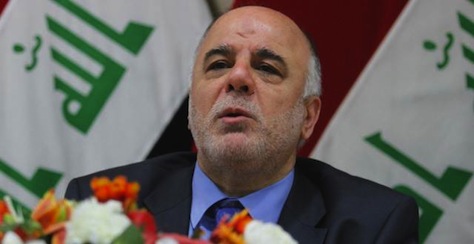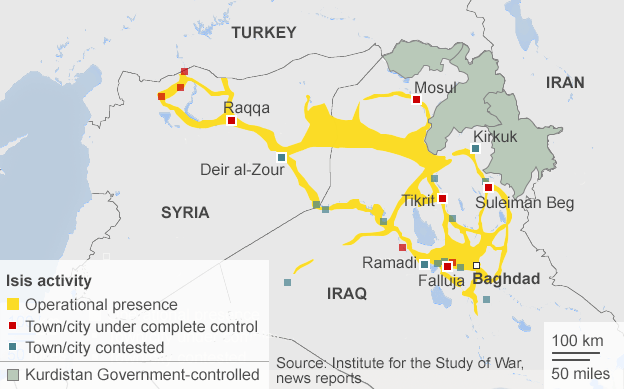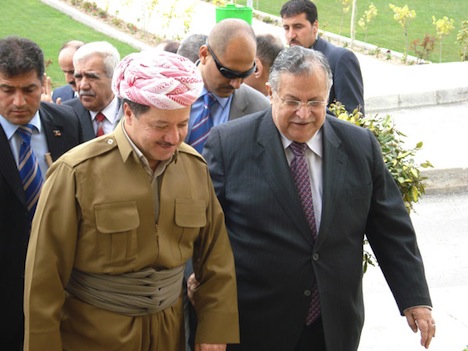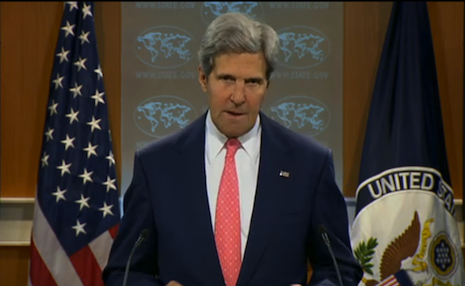
January 2014 marks the 50th anniversary of the release of Stanley Kubrick’s dark nuclear war comedy Dr Strangelove or: How I Learned to Stop Worrying and Love the Bomb.


It’s the charming tale of U.S. general Jack Ripper (Get it!?), who’s gone completely off his rocker and launches the world into a nuclear crisis as the United States and the Soviet Union bumble to stop the fallout from the chain of events that the wayward general sets in place.
In the U.S. war room, the meek U.S. president (played brilliantly by Peter Sellers) asks another general, ‘Buck’ Turgidson, why a renegade general somehow found a way to order the use of nuclear weapons outside the chain of command, given that the U.S. president is the only one authorized to launch a nuclear attack.
Turgidson replies, ‘And although I, uh, hate to judge before all the facts are in, it’s beginning to look like, uh, General Ripper exceeded his authority.’
It’s starting to look like last week’s horrific chemical warfare attack was a case of someone in the regime of Syrian president Bashar al-Assad exceeding his authority as well.
Did Syria have a ‘Dr. Strangelove’ moment?
And if so, how should the international community ‘punish’ the Assad regime if it turns out that a rogue pro-Assad commander launched the attack and not Assad or his top guard? Is there some sort of negligence per se standard for crimes against humanity? Even as British prime minister David Cameron is backing down from the urgency of an immediate Syria strike (at least until the United Nations finishes its initial assessment of the chemical attack in the days ahead) and French president François Hollande is emphasizing a political solution to Syria, the case for an overhasty, unilateral military response from the United States is falling apart in favor of a multilateral, evidence-based approach that would otherwise avoid further internationalizing the two-year, sectarian Syrian conflict.
Late Tuesday, Noah Shachtman, a nonresident fellow at the Brookings Institution broke the story in Foreign Policy that the United States and its allies are so certain that the Assad regime is responsible for last Wednesday’s attack on the basis of intercepted phone calls that largely show confusion and panic on the part of the Syrian regime:
Last Wednesday, in the hours after a horrific chemical attack east of Damascus, an official at the Syrian Ministry of Defense exchanged panicked phone calls with a leader of a chemical weapons unit, demanding answers for a nerve agent strike that killed more than 1,000 people. Those conversations were overheard by U.S. intelligence services, The Cable has learned. And that is the major reason why American officials now say they’re certain that the attacks were the work of the Bashar al-Assad regime — and why the U.S. military is likely to attack that regime in a matter of days.
But the intercept raises questions about culpability for the chemical massacre, even as it answers others: Was the attack on Aug. 21 the work of a Syrian officer overstepping his bounds? Or was the strike explicitly directed by senior members of the Assad regime? “It’s unclear where control lies,” one U.S. intelligence official told The Cable. “Is there just some sort of general blessing to use these things? Or are there explicit orders for each attack?”
Nor are U.S. analysts sure of the Syrian military’s rationale for launching the strike — if it had a rationale at all. Perhaps it was a lone general putting a long-standing battle plan in motion; perhaps it was a miscalculation by the Assad government. Whatever the reason, the attack has triggered worldwide outrage, and put the Obama administration on the brink of launching a strike of its own in Syria. “We don’t know exactly why it happened,” the intelligence official added. “We just know it was pretty fucking stupid.”
Of course, that calls into question the strident and unequivocal stance of many U.S. and European officials over the weekend and earlier this week, including British foreign minister William Hague and U.S. secretary of state John Kerry.
Today brings further news that top U.S. intelligence officials who have seen the U.S. report on the Assad regime’s culpability believe that it is not a ‘slam dunk’ case, a reference to the allegedly solid intelligence that the U.S. Central Intelligence Agency held in 2002 that implicated Iraqi president Saddam Hussein — erroneously — with having a nuclear weapons program:
A report by the Office of the Director for National Intelligence outlining that evidence against Syria includes a few key caveats – including acknowledging that the U.S. intelligence community no longer has the certainty it did six months ago of where the regime’s chemical weapons are stored, nor does it have proof Assad ordered chemical weapons use, according to two intelligence officials and two more U.S. officials.
But one senior U.S. official who read the report said Thursday that despite those caveats, the report assesses with “high confidence” that the Syrian government was responsible…. The official conceded that there is no proof listed in the report tying Assad personally to ordering the attack, but the official also said there was no mention in the report of the possibility that a rogue element could have been responsible.
That’s certainly very consistent with Shachtman’s report, and it makes intuitive sense. With Assad generally winning the war and reclaiming ground against the disparate opposition, it makes no sense for Assad to draw the ire of the world by launching chemical warfare on civilians. The timing, moreover, has always been suspicious given that United Nations chemical weapons inspectors were sitting in a Damascus hotel when the chemical attack occurred. We know that the Assad regime has certain access to chemical weapons, and while there’s a possibility that some weapons have fallen into the hands of anti-Assad rebels, this explanation is certainly less harrowing than the alternative possibility that radical opposition elements launched a toxic chemical attack in the hopes of framing Assad and drawing the international community against him.
Although we’re still awaiting the intelligence report that the United States promised to release this week, the public British report released earlier today has been thoroughly panned:
In an echo of the buildup to the Iraq war in 2003, Downing Street took the rare step of releasing the assessment of the JIC to support its case that the Assad regime was responsible. But the assessment was mainly based on “open source” evidence such as video footage of the victims and a judgment that the opposition does not have the capability to launch such an attack…
The JIC acknowledged that some of its assessment was based on “open source” evidence such as testimony from victims, doctors and video footage. But in a separate letter to Cameron the JIC chairman, Jon Day, said he had seen “highly sensitive” unpublished intelligence that supported their view that the regime had launched the attacks to clear the opposition from strategic parts of Damascus.
But, of course, the British government isn’t providing the unpublished intelligence, so their rationale essentially boils down to, ‘trust us.’ Moreover, as Guardian commentators Ian Black and Ian Sample write, the intelligence reports boasts no scientific evidence and rests on little more than informed speculation:
In one passage the JIC appears to weaken its own conclusions by noting that there was “no obvious political or military trigger for regime use of CW on an apparently larger scale now” – given the presence of the UN inspectors. It wrote that permission to authorise CW had “probably been delegated” by Assad to “senior regime commanders, such as [*]”. It added: “But any deliberate change in the scale and nature of use would require his authorisation.” That language suggests the possibility, as reported in the US, of unauthorised or accidental use of CW munitions.

![]()








